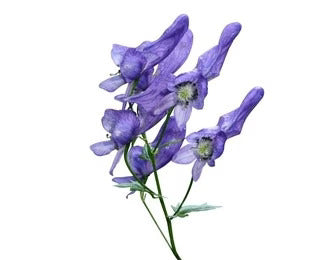Ativisha grows in India's coldest regions. It is common in the alpine areas and can reach heights of up to 2,000 feet above sea level. The majority of the plant's alkaloids, including aconitine, atisine, heterophyllin, and heterophyllisin, are derived from the plant's roots.
The plant has tuberous, paired roots. They could be gray or white in color. A simple or branching stem can reach a height of 15 to 20 cm. The leaves are glabrous and heteromorophous. The inflorescence, which can be white or violet in color, is how the flowers typically appear. Pyramid-shaped, blackish, or brownish seeds are also possible.
General Information
The ayurvedic term for a herb called "atis" in Hindi is "ativisha." It is covered in great detail in the early Ayurvedic writings of Charaka and Sushruta.
One of the best herbs for children's digestive issues is this one. It has a carminative effect and is great for keeping the digestive system in good shape. Ativisha is a term for a toxic substance, however, despite its toxic qualities, it is regarded as one of the best medicinal plants in Ayurveda.
This plant is known by its Latin name, Aconitum heterophyllum, and is a member of the Ranunculaceae family.
The following is a list of the plant's alkaloids:-
Diterpene alkaloids, heterophylline, Atidine, hetisine, heteratisine, heterophyllidine hetidine, heterophyllisine, atidine & Atisenol, and a new entatisene diterpenoid lactone from roots.
Hetisinone, heteratisine, hetisine, F-dishydrçatisine, hetidine, benzylleteratisine, beta—sitosterol, carotene and 3— isoatisine from the rhizomes
Other Names
- Sanskrit synonyms - Ativisha, Kashmeera, Shuklakanda, Bhangura, Vishva, Visha, Ghunapriya, Shrungi, Shophahaa, Mahaushadham, Shyamakanda etc.
- English name - Indian Atees
- Hindi name - Atis, Atees
- Bengali name - Ataich
- Kannada name - Ativisha, Atibage
- Tamil and Malayalam name - Atividyam, Ativisam, Atividayam, Athividayam
- Marathi name - Ativish
- Persian name - Vajjeturki
- Punjabi name - Atis
- Telugu name - Ati Vasa
- Gujarati name - Ativakhani Kali, Ativish
- Konkani name - Atibaje
Special Activity
The body is less poisonous after consuming Ativisha. All three doshas in the body are balanced, although kapha and pitta are notably benefited.
Classification
- Kingdom - Plantae
- Order - Ranunculales
- Family - Ranunculaceae
- Genus - Aconitum
Ayurvedic Properties
|
Particular |
Hindi / Sanskrit |
English |
|
Rasa (Taste) |
Katu, Tikta |
Pungent, Bitter |
|
Guna (Physical Property) |
Laghu, Ruksha |
Light, Dry |
|
Virya (Potency) |
Ushna |
Hot |
|
Vipaka (Post-Digestive Taste) |
Katu |
Pungent |
|
Prabhava(Exclusive Action) |
Vishahara |
Anti - Toxic |
Effects on Doshas
It harmonizes the body's three doshas. Pitta and Kapha doshas predominate in the body.
|
Charak Samhita |
Sushrut Samhita |
Ashtanga Sangraha |
Ashtanga Hrdya |
|
|
Pippalyadi, Mustadi, Vacadi |
Lekhaniya, Arsöghna, Pippalyadi, Mustadi, Vacadi |
Practical Uses
- Ativisha is a multipurpose herbal remedy for all digestive issues, including breaking down and digesting undigested food that creates "Ama" in the body and causes a number of terrible ailments.
- The herb works as a carminative to treat diarrhea by removing extra bodily fluids.
- Additionally, it helps with coughing and colds. When it comes to digestive issues, people often experience vomiting as well, and Atis can assist with that.
- Additionally useful for fever, particularly viral fever, diarrhea, dysentery, etc. is this herb. It has a long history of use as a traditional treatment because of this.
- Atis medicines can also help with IBS, piles, and hemorrhoids.
- Atis is an excellent plant for general body detoxification. It can be used to treat worms, which are a prevalent problem in youngsters. The plant can also cleanse the blood and tissues.
- Ativisha nourishes the body with its strong flavor. It also helps to increase the consistency of breast milk.
- Atis contains aphrodisiac effects, making it useful for managing sexual health in both men and women.
- Ativisha literally translates to "one with excessive poison," but we still utilize it as a herbal remedy. The reason for this is that many herbs have harmful properties by nature, but when administered in the proper dosage, they can have wonderful therapeutic effects on the body. Because of this, Ativisha is used to treat rat poisoning, obesity, and any other condition caused by an outside invasion of the body by bacteria, viruses, or other similar germs.
A Word of Caution
If used excessively, Atis can cause severe vomiting, trembling, and mouth dryness. It is advisable to avoid using it while pregnant or nursing.
Parts Used
The most frequently used portion of this plant for therapeutic purposes are the root tubers..
Dosage
- For adults: 1-3 grams per day.
- For children: 1 gram daily, split into two doses.

